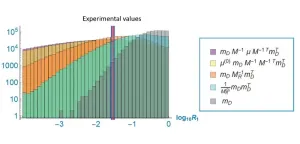(Press-News.org) The use of coal power is not decreasing fast enough. The Paris Agreement’s target of a maximum of 2 degrees of warming appear to be missed, and the world is moving towards a temperature increase of 2.5–3 degrees. At the same time it is feasible to avoid higher warming. This is shown by researchers from Chalmers University of Technology and Lund University, Sweden, in a new study.
“More and more countries are promising that they will phase out coal from their energy systems, which is positive. But unfortunately, their commitments are not strong enough. If we are to have a realistic chance of meeting the 2-degree target, the phasing out of coal needs to happen faster”, says Aleh Cherp, professor at the International Institute for Industrial Environmental Economics at Lund University.
China and India need to begin phasing out their coal use
Phasing out coal is necessary to keep the world’s temperature increase below 2 degrees, compared to pre-industrial levels. In a study by the research programme Mistra Electrification, a group of researchers have analysed 72 countries’ pledged commitments to phase out their coal use by 2022–2050.
In the best-case scenario, the researchers show that it is possible that the temperature increase will stay at 2 degrees. But that assumes, among other things, that both China and India begin phasing out their coal use within five years. Furthermore, their phase-out needs to be as rapid as it has been in the UK, which is the fastest that ever happened in a large country, and faster than Germany has promised. This may create inequities which will need to be addressed by international policies.
Global warming of up to 3 degrees is likely
The research group has also developed scenarios that they consider to be the most realistic. These scenarios indicate that Earth is moving towards a global warming of 2.5–3 degrees.
“The countries’ commitments are not sufficient, not even among the most ambitious countries. In addition, Russia’s invasion of Ukraine may prevent some countries from phasing out coal as they promised”, says Jessica Jewell, Associate Professor at the Division of Physical Resource Theory at Chalmers University of Technology.
The study shows that the 72 countries’ commitments to phase out coal power are similar to each other and in line with historical data for how quickly coal power was phased out in the past.
More about the study
Read the full article in Environmental Research Letters: Phasing out coal for 2 °C target requires worldwide replication of most ambitious national plans despite security and fairness concerns. The authors of the article are: Aleh Cherp, Lund University and Jessica Jewell, Vadim Vinichenko, Marta Vetier and Lola Nacke, Chalmers University of Technology.
For further information, please contact:
Aleh Cherp, Professor at the International Institute for Industrial Environmental Economics, Lund University, aleh.cherp@iiiee.lu.se +46 46 222 02 53
Jessica Jewell, Associate Professor at the Division of Physical Resource theory, Chalmers University of Technology, jewell@chalmers.se +46 31 772 61 06
About Mistra Electrification
The Mistra Electrification research program aims to accelerate the transition to a sustainable and efficient energy system. The program will produce knowledge, with a focus on electrification and sector coupling, to enable a fair transition. The main financier is the research foundation Mistra. The program is hosted by the research company Energiforsk, which leads the program together with Chalmers University of Technology. at www.mistraelectrification.com
Captions
Aleh Cherp, Professor at the International Institute for Industrial Environmental Economics, Lund University. Photo: Central European University.
Jessica Jewell, Associate Professor at the Division of Physical Resource theory, Chalmers University of Technology. Photo: Chalmers.
END
Moving towards 3 degrees of warming – the phasing out of coal is too slow
2023-04-06
ELSE PRESS RELEASES FROM THIS DATE:
Newly discovered probiotic could protect Caribbean corals threatened by deadly, devastating disease
2023-04-06
Researchers with the Smithsonian’s National Museum of Natural History have discovered the first effective bacterial probiotic for treating and preventing stony coral tissue loss disease (SCTLD), a mysterious ailment that has devastated Florida’s coral reefs since 2014 and is rapidly spreading throughout the Caribbean.
The probiotic treatment, described in a paper published today in Communications Biology, provides an alternative to the use of the broad-spectrum antibiotic amoxicillin, which has so far been the only proven treatment for the disease but which runs the risk of promoting antibiotic-resistant bacteria.
SCTLD ...
Significant step in fight against drug resistance in TB
2023-04-06
University of Otago researchers have discovered new ways to treat antibiotic-resistant strains of tuberculosis (TB), opening the door to new approaches for tackling the disease that kills about 4,000 people a day.
Led by PhD candidate Natalie Waller and Senior Author Dr Matthew McNeil, of the Department of Microbiology and Immunology, researchers were able to identify antibiotics that could rapidly kill drug resistant strains of TB and when combined could stop drug resistance from occurring altogether.
TB is a major global cause of infectious disease morbidity and mortality, second only to COVID-19 and is one of the hardest infections to treat. ...
Pancreatic lesions may occur more frequently than previously thought
2023-04-06
Bottom Line: Pancreatic intraepithelial neoplasia (PanIN) lesions were detected in a majority of healthy pancreata from deceased donors of diverse age and harbored features of pancreatic cancer.
Journal in Which the Study was Published: Cancer Discovery, a journal of the American Association for Cancer Research
Authors: Marina Pasca di Magliano, PhD, co-corresponding author of the study, a researcher at the Rogel Cancer Center, and a professor of surgery and of cell and developmental biology at Michigan Medicine at the University of Michigan
Timothy Frankel, MD, co-corresponding author, a researcher at the Rogel Cancer Center, and an ...
People with obesity due to genetic predisposition have lower risk of cardiovascular disease
2023-04-06
The risk of developing cardiovascular disease is lower in people with obesity who have a genetic predisposition for high BMI than people with obesity influenced mainly by environmental factors such as lifestyle, researchers from Karolinska Institutet report in eClinicalMedicine.
There has been a global increase in the incidence of overweight and obesity over the past few years. Almost one third of the world’s population now lives with overweight or obesity.
“The figure is alarming since it is well-established that a high BMI in middle-age increases the risk of developing ...
Obstructive sleep apnea may directly cause early cognitive decline
2023-04-06
Obstructive sleep apnea (OSA) is a potentially dangerous condition. During sleep, the throat muscles of people with OSA relax and block the airflow into the lungs, so that they repeatedly stop breathing. Common symptoms of OSA include restless sleep, loud snoring, daytime sleepiness, and prolonged headaches in the morning – highly debilitating for patients and their partners.
OSA is currently underdiagnosed: it may occur in as much as 15 to 30% of men and 10 to 15% of women, or approximately 1bn adults worldwide, of whom an estimated 80% don’t know they have it. Major risk factors for OSA include middle or old age, being obese, smoking, ...
Random matrix theory approaches the mystery of the neutrino mass!
2023-04-06
When any matter is divided into smaller and smaller pieces, eventually all you are left with—when it cannot be divided any further—is a particle. Currently, there are 12 different known elementary particles, which in turn are made up of quarks and leptons each of which come in six different flavors. These flavors are grouped into three generations—each with one charged and one neutral lepton—to form different particles, including the electron, muon, and tau neutrinos. In the Standard Model, the masses of the three generations of neutrinos are represented by a three-by-three ...
Lab-grown fat could give cultured meat real flavor and texture
2023-04-06
Researchers at Tufts University have successfully bulk-produced fat tissue in the lab that has a similar texture and make-up to fat tissue naturally occurring in animals. The results, described in a study published today in eLife, could be applied to the production of cultured meat grown entirely from cells, giving it a more realistic texture and flavor.
Startup companies around the world are developing cultivated meat—cell-grown chicken, beef, pork, and fish. Most are in early stages of development, not ready for large-scale production and, with a ...
Disruption from war in Ukraine pushes highly contagious infectious diseases to alarming levels
2023-04-06
Analysis of official Ukraine health data reveals a perfect storm of rising infectious diseases cases and falling levels of childhood vaccination and case detection in the frontline eastern region of Kharkiv.
Between January and September 2022, new cases of rubella were 23 times higher among children living in the Kharkiv region than average rates across Ukraine, while shigellosis (diarrhoeal disease) and viral meningitis incidence was around 6 times higher, and whooping cough 5 times greater.
But registration of infectious disease cases halved in Kharkiv ...
Air pollution may increase risk for dementia
2023-04-06
Key points:
This meta-analysis, which includes the most recent studies evaluating the link between air pollution and dementia, is the first to include studies based on active case ascertainment and to evaluate studies using a new, more powerful bias assessment tool.
The findings support the public health importance of a proposal, currently under consideration by the Environmental Protection Agency, to strengthen regulations on PM2.5
Boston, MA—Exposure to fine particulate air pollutants (PM2.5) may increase the risk of developing dementia, according to a new meta-analysis from Harvard T.H. Chan School of Public Health.
“This is a big step in providing actionable ...
Exposure to fine particle air pollution linked to heightened dementia risk
2023-04-06
Exposure to fine particulate matter (PM2.5) air pollution is linked to a heightened risk of dementia, even at levels below current US, UK and European air quality standards, finds research published by The BMJ.
More limited data suggests that exposure to nitrogen dioxide and nitrogen oxide might also be a risk factor for dementia.
Many uncertainties remain, so caution is needed when interpreting these findings, but the researchers say the results “strengthen the evidence that air pollutants are risk factors for dementia.”
More than 57 million people worldwide are living with dementia and the global ...




